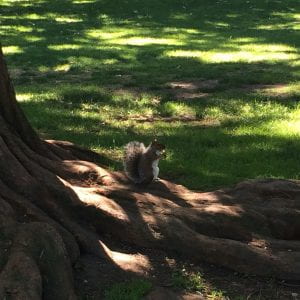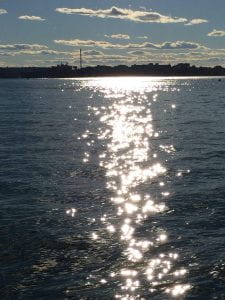“I need only someplace where I could think straight, remember, and properly invent. I need the blessed emptiness of mind that comes from birdsong and dripping trees. I needed to sleep at night in a square box made of chestnut trees who died of natural causes”
(Barbara Kingslover, Knowing Our Place).
Living in the city for most of my life is great but I also yearn for peace and serenity that comes from real nature. The best way for me to capture “somewhat” of the beauty that the wilderness has to offer is my art or by taking naturistic city photos. Then I have a memory of all of the beauty that have crossed my path at some time or another, some that I never imagined would be so majestic. But then, I have to pause and remember that THERE IS naturistic beauty all around us, no matter where we are, even in the city, on a gloomy day.
serenity that comes from real nature. The best way for me to capture “somewhat” of the beauty that the wilderness has to offer is my art or by taking naturistic city photos. Then I have a memory of all of the beauty that have crossed my path at some time or another, some that I never imagined would be so majestic. But then, I have to pause and remember that THERE IS naturistic beauty all around us, no matter where we are, even in the city, on a gloomy day.
Kingslovers theory that “we need wilderness” is quite TRUE – “we sing the song of our home because we are animals, and an animal is no better or wiser or safer than its own habitat and it’s food chain” (Kingslover). We live in what we became comfortable with, and for some it’s urban areas, like NYC, SF, Boston. This in turn makes us function accordingly; busy, movers and shakers. However, people who live in rural places like the country where there are lakes and not much buildings, cars, or much of any developed structures, seem to be more relaxed. Depending on perception, there is “privilege” on both sides whether wilderness or city life.
When I think of peace and serenity, the things that comes to mind are green trees, mountains, beautifully flowing water, animals like horses and butterflies, etc. This is because these are the natural things that reminds me of who I am, and that I am part of mother earth. Peace and serenity to me is also a spiritual state of mind that I have in connection with nature. And therefore, I’ve came to understand that even when I am not in the wilderness of nature, there is nature all around me at home or in the liminal places of the city. But there is a significant difference between manmade nature such as planted trees, beautiful plants and things that are manicured vs. real nature made. So, the feeling I get when I look at nature in the city, is not the same feeling I get from being in the wilderness. Which makes me realize that there is still a missing part to peace and serenity that is influenced by the wilderness.
I think that the roles women play in their lives, mother, wife caretakers largely depend not just on how we are viewed in society, but largely on how we understand ourselves. I say this because our diverse environments play a role in nature relating to culture, which helps us develop our personalities. For example, if I’m out having an awful time or feeling sick, the place I think about the most is the comfort of my home. As it follows, this is where my personality is different and I am more relaxed. Yet when I’m home and having a bad day, I tend to think about the places that brings me the most comfort and I circle back to nature; the peace of the “wilderness”. Therefore my geographical location in connection to the majestic place I imagine, comes from my interaction with the wilderness.
So I say—To mother nature, we are but a drop of oil in water, in place yet “displaced” from ourselves.
Annotated Bibliography
http://www.pbs.org/now/printable/transcript_smallwonder_print.html
Barabara Kingslover’s is a writer of poems, novels and essays. Her article –A knowing Place, is a description of how the wilderness is an important aspect of human interaction to our geography. She entails the differences of where she is (physically, mentally and emotionally) in relation to her family history as well as her connection to the naturistic beauty that surrounds her.


Test
Confirmed
Second time